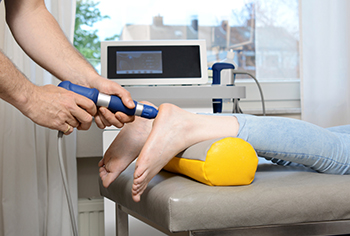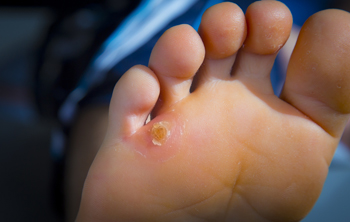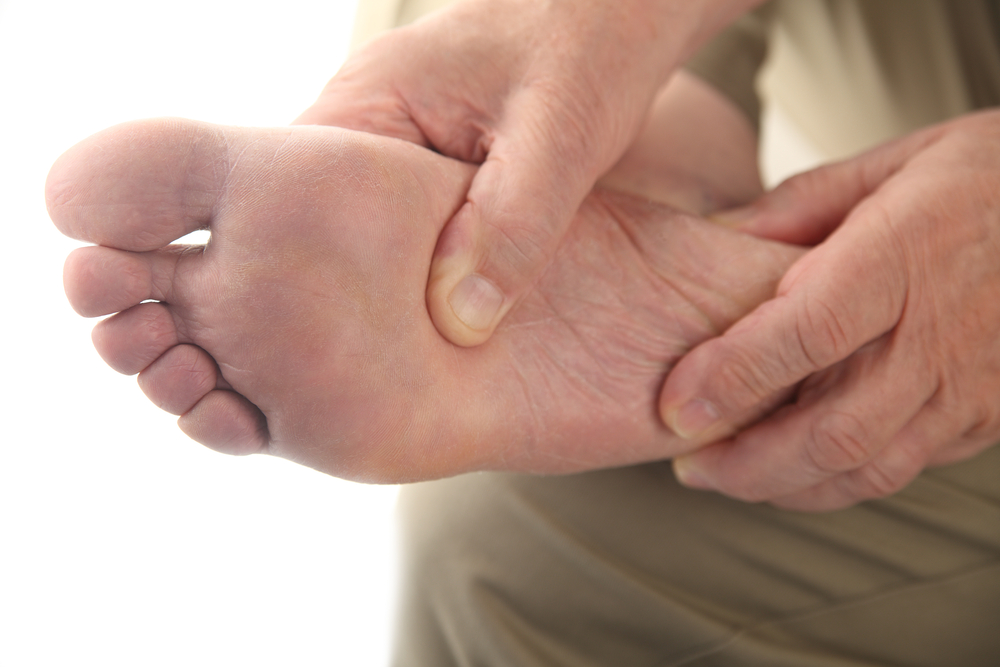November 2021
What Is Extracorporeal Shock Wave Therapy (ESWT)?
In Extracorporeal Shock Wave Therapy (ESWT), a handheld device sends a series of acoustic pulses through the surface of the skin to an area of damaged tissue. This intense energy creates a microtrauma in the injured tissue, causing the body to respond by increasing blood circulation and metabolism. This accelerates the body’s natural healing response, helps the body to produce new cells, and reduces pain. Shockwave therapy is a non-invasive treatment with minimal side effects. The treatments only take a couple of minutes and are usually administered once a week for 3-4 weeks or more, depending on the level of damage/pain and how long it has been present. Shockwave therapy can be very effective in the treatment of plantar fasciitis, Achilles tendinopathy, and more. Contact your podiatrist to see if your condition may be treated with ESWT.
Shockwave therapy is a treatment commonly used to treat various injuries and conditions, particularly plantar fasciitis in the feet. To learn more, consult with one of our podiatrists from Coastal Foot & Ankle Wellness Center, LLC. Our doctors can provide the care you need to keep you pain-free and on your feet.
Shockwave Therapy
Shockwave therapy is a new treatment option designed to treat bone conditions such as tennis elbow, shoulder pain, and others. Shockwave therapy uses high intensity sound waves that are directed to the affected tissues of the body with pinpoint accuracy. The effects are very beneficial, leading to a production of collagen fibers, eliminating inflammation.
Who Benefits from Shockwave?
Shockwave is recommended for patients suffering from heel pain and associated problems. Heel pain is a common condition which can be caused by obesity, overexertion, and spending a substantial amount of time on hard floors with your feet exposed and unsupported.
Fast and Easy
The therapy is actually a simple process that can leave patients feeling better the very next day. Shockwave therapy is not as dramatic as it sounds. It enables more blood flow to effected areas, addressing the source of the problem and allowing treatment to last for a long time.
Treatment & Recovery Time
Shockwave treatment will enable your feet to recover quickly. This is especially important since surgery is not required. It is cost effective and does not require the use of anesthesia. This treatment is a better option to surgery, since it is proven safe.
If you have any questions, please feel free to contact one of our offices located in St. Augustine, and Palatka, FL . We offer the newest diagnostic and treatment technologies for all your foot and ankle needs.
How Are Corns Removed?
Corns are small, hardened bumps of skin that can grow on the feet due to friction. Even though they are small, corns can be tender and painful enough to interfere with daily activities. In addition to more conservative treatments like resting the affected foot and wearing wider, more comfortable shoes, various other treatment methods can be used to help get rid of a corn. Corns can be chemically removed using salicylic acid to pare down dead, thickened skin before it is trimmed off. More stubborn corns can also be removed with a scalpel by your podiatrist. If you have painful corns, it is suggested that you seek the care of a podiatrist near you.
Corns can make walking very painful and should be treated immediately. If you have questions regarding your feet and ankles, contact one of our podiatrists of Coastal Foot & Ankle Wellness Center, LLC. Our doctors will treat your foot and ankle needs.
Corns: What Are They? And How Do You Get Rid of Them?
Corns are thickened areas on the skin that can become painful. They are caused by excessive pressure and friction on the skin. Corns press into the deeper layers of the skin and are usually round in shape.
Ways to Prevent Corns
There are many ways to get rid of painful corns such as:
- Wearing properly fitting shoes that have been measured by a professional
- Wearing shoes that are not sharply pointed or have high heels
- Wearing only shoes that offer support
Treating Corns
Although most corns slowly disappear when the friction or pressure stops, this isn’t always the case. Consult with your podiatrist to determine the best treatment option for your case of corns.
If you have any questions please feel free to contact one of our offices located in St. Augustine, and Palatka, FL . We offer the newest diagnostic and treatment technologies for all your foot and ankle needs.
Stress Fractures 101
 A small hairline fracture is also referred to as a stress fracture. While stress fractures can occur in the pelvis, thigh bones, and shins, they most commonly occur in the lower legs, particularly affecting the bones of the midfoot. Stress fractures may occur in the foot because it is no longer able to bear weight. They are not commonly a result of a specific injury, but they are usually a result of overuse or repetitive motion. Because of this, athletes like runners, soccer players, and dancers are more likely to develop stress fractures. A common sign of a stress fracture is a sharp pain that is felt when bearing weight that will persist overtime or get worse as the fracture also worsens. Those who are experiencing foot pain and believe that they may have a stress fracture should consult with a podiatrist for treatment.
A small hairline fracture is also referred to as a stress fracture. While stress fractures can occur in the pelvis, thigh bones, and shins, they most commonly occur in the lower legs, particularly affecting the bones of the midfoot. Stress fractures may occur in the foot because it is no longer able to bear weight. They are not commonly a result of a specific injury, but they are usually a result of overuse or repetitive motion. Because of this, athletes like runners, soccer players, and dancers are more likely to develop stress fractures. A common sign of a stress fracture is a sharp pain that is felt when bearing weight that will persist overtime or get worse as the fracture also worsens. Those who are experiencing foot pain and believe that they may have a stress fracture should consult with a podiatrist for treatment.
Stress fractures occur when there is a tiny crack within a bone. To learn more, contact one of our podiatrists from Coastal Foot & Ankle Wellness Center, LLC. Our doctors can provide the care you need to keep you pain free and on your feet.
How Are They Caused?
Stress fractures are the result of repetitive force being placed on the bone. Since the lower leg and feet often carry most of the body’s weight, stress fractures are likely to occur in these areas. If you rush into a new exercise, you are more likely to develop a stress fracture since you are starting too much, too soon. Pain resulting from stress fractures may go unnoticed at first, however it may start to worsen over time.
Risk Factors
- Gender – They are more commonly found in women compared to men.
- Foot Problems – People with unusual arches in their feet are more likely to develop stress fractures.
- Certain Sports – Dancers, gymnasts, tennis players, runners, and basketball players are more likely to develop stress fractures.
- Lack of Nutrients – A lack of vitamin D and calcium may weaken the bones and make you more prone to stress fractures
- Weak Bones – Osteoporosis can weaken the bones therefore resulting in stress fractures
Stress fractures do not always heal properly, so it is important that you seek help from a podiatrist if you suspect you may have one. Ignoring your stress fracture may cause it to worsen, and you may develop chronic pain as well as additional fractures.
If you have any questions, please feel free to contact one of our offices located in St. Augustine, and Palatka, FL . We offer the newest diagnostic and treatment technologies for all your foot care needs.
Heel Pain Can Be Treated!
Plantar Fasciitis and Other Causes of Heel Pain
Most heel pain is caused by a local condition occurring in the foot. The most common type of heel pain is due to plantar fasciitis—an inflammation of the long band of tissue running along the bottom of the foot, connecting the toes with the heel. Anyone can have plantar fasciitis. However, athletes and people who are obese or have diabetes, flat feet, or who wear worn out shoes, are more susceptible to developing this painful condition. Heel spurs may often occur along with plantar fasciitis because the strain on the heel bone which causes plantar fasciitis can also lead to calcium deposits forming on the bone (heel spurs). When the bursa sac at the back of the heel becomes irritated and inflamed, this is known as bursitis. A condition called “pump bump” also affects the back of the heel when pressure from wearing pumps causes a painful, bony growth to develop. Podiatrists are very experienced in treating these forms of heel pain and more, so if you experience any heel discomfort, make an appointment today.
Many people suffer from bouts of heel pain. For more information, contact one of our podiatrists of Coastal Foot & Ankle Wellness Center, LLC. Our doctors can provide the care you need to keep you pain-free and on your feet.
Causes of Heel Pain
Heel pain is often associated with plantar fasciitis. The plantar fascia is a band of tissues that extends along the bottom of the foot. A rip or tear in this ligament can cause inflammation of the tissue.
Achilles tendonitis is another cause of heel pain. Inflammation of the Achilles tendon will cause pain from fractures and muscle tearing. Lack of flexibility is also another symptom.
Heel spurs are another cause of pain. When the tissues of the plantar fascia undergo a great deal of stress, it can lead to ligament separation from the heel bone, causing heel spurs.
Why Might Heel Pain Occur?
- Wearing ill-fitting shoes
- Wearing non-supportive shoes
- Weight change
- Excessive running
Treatments
Heel pain should be treated as soon as possible for immediate results. Keeping your feet in a stress-free environment will help. If you suffer from Achilles tendonitis or plantar fasciitis, applying ice will reduce the swelling. Stretching before an exercise like running will help the muscles. Using all these tips will help make heel pain a condition of the past.
If you have any questions please contact one of our offices located in St. Augustine, and Palatka, FL . We offer the newest diagnostic and treatment technologies for all your foot and ankle needs.
The Do’s of Diabetic Foot Care
People with diabetes are at an increased risk for developing foot ulcers and a variety of other foot problems. This is because diabetes can cause poor circulation, nerve damage, and immune insufficiency. Without an adequate blood supply, innervation, and a strong immune response, even small injuries on the feet can go undetected in their initial stages, heal poorly, and become infected. Taking very good care of your feet is essential if you are diabetic. At home, check your feet daily for any cuts, scrapes, sores, bruises, or other abnormalities and treat them as soon as possible. Take any excess pressure off your feet, especially if you have a foot wound, by resting or wearing an orthotic or off-loading device. You should also be under the care of a podiatrist who can monitor your foot health and treat any problems as soon as they occur.
Diabetic foot care is important in preventing foot ailments such as ulcers. If you are suffering from diabetes or have any other concerns about your feet, contact one of our podiatrists from Coastal Foot & Ankle Wellness Center, LLC. Our doctors can provide the care you need to keep you pain-free and on your feet.
Diabetic Foot Care
Diabetes affects millions of people every year. The condition can damage blood vessels in many parts of the body, especially the feet. Because of this, taking care of your feet is essential if you have diabetes, and having a podiatrist help monitor your foot health is highly recommended.
The Importance of Caring for Your Feet
- Routinely inspect your feet for bruises or sores.
- Wear socks that fit your feet comfortably.
- Wear comfortable shoes that provide adequate support.
Patients with diabetes should have their doctor monitor their blood levels, as blood sugar levels play such a huge role in diabetic care. Monitoring these levels on a regular basis is highly advised.
It is always best to inform your healthcare professional of any concerns you may have regarding your feet, especially for diabetic patients. Early treatment and routine foot examinations are keys to maintaining proper health, especially because severe complications can arise if proper treatment is not applied.
If you have any questions please feel free to contact one of our offices located in St. Augustine, and Palatka, FL . We offer the newest diagnostic and treatment technologies for all your foot and ankle needs.












